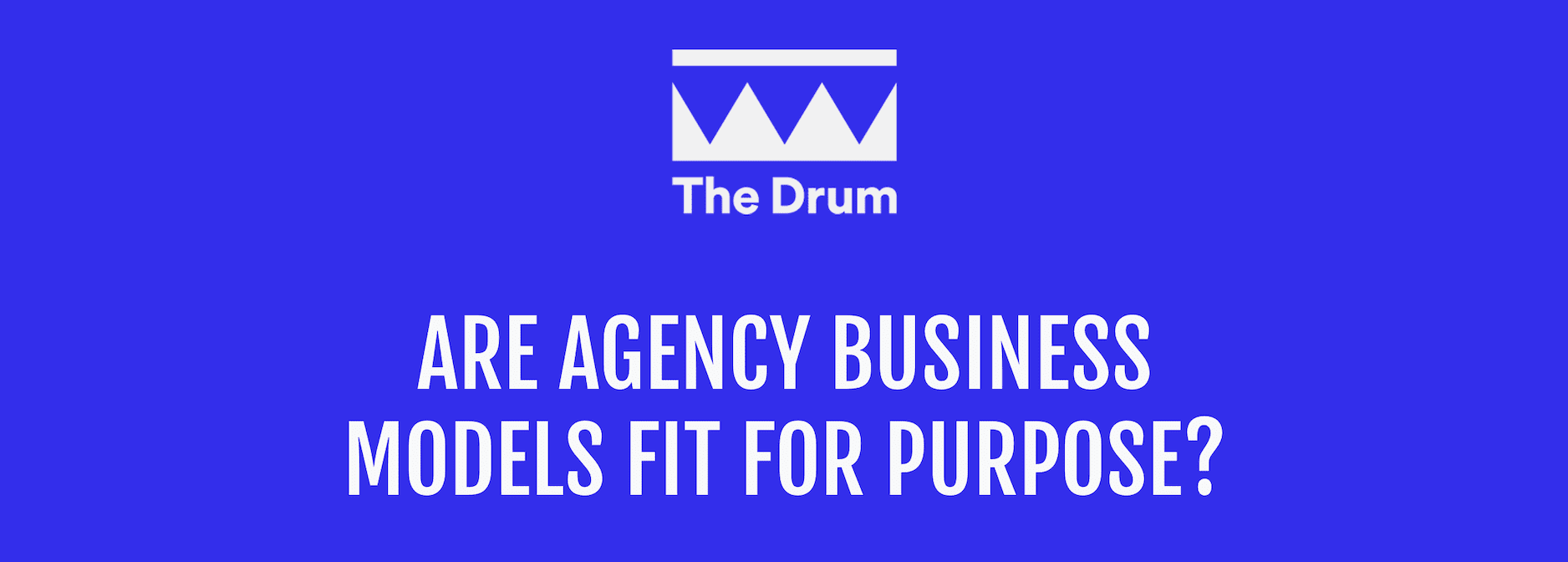In the Drum’s podcast, Chris Woodward discusses the nature of agency business models, and the position of OLIVER’s unique model within the industry.
Agencies are sometimes caught between wanting to work for great clients whose requirements fall outside of their model and sticking to their business model.
Many agencies prefer a specific long-term direction that focuses on specific services, and sometimes that means having to turn down otherwise excellent clients.
“Should agencies change their business model to accommodate client needs?”
THE DRUM:“Keith Weed argued that it’s better if clients make clear their brand development strategies and what services they need, and agencies then accommodate accordingly. Do you agree with that?”
CHRIS: “It’s an interesting question. Our business is predicated on designing distinct offerings for each client, so no two offerings are the same. OLIVER is so enmeshed within client’s’ brands that we’re able to help develop their business strategy, which then informs their marketing strategy.
“Primarily, our operations are geared toward getting brands closer to customers, rather than taking a specific client or brand-based standpoint.”
“How has the conversation around agency business models changed?”
CHRIS: “Client appetite for different agency models has accelerated, especially during and post-Covid, which is an attractive prospect for us as we’re a different model – which has grown nationally and internationally. OLIVER’s growth suggest clients do want different ways to work with their agency partners
“A couple of years ago, the question would have been ‘should you consider building an in-house agency?’ Now the question might be ‘why wouldn’t you? Why would you go with a more traditional agency model?’
“It’s thought that certain agency models can hamstring an agency’s agility and ability to react. Where has this perception come from?”
THE DRUM: “have you seen any shift in the perception about how fast agencies move, as you’ve grown?”
CHRIS: “OLIVER is fortunate in that we’re so client-orientated, so we’ve been able to move quickly within the client’s world and react positively, such as Covid and how we deployed our people.
“Sometimes more traditional agency models -while they produce great work- lack the flexibility to move with the client’s needs long-term. They produce one type of work in one way. While that can be exactly what a client needs at a specific time, it doesn’t always feel in tune with what the brand needs long-term.
“Our bespoke solution design helps us stay agile and produce different types of work at different times, which is adapted to the client’s marketing journeys. We focus on evolving with clients to address their needs. The set-up OLIVER builds in year one will be configured differently in years two, three and four, for example.”
“How would you define OLIVER’s agency model?
CHRIS: “We’ve got one very specific focus, which is the creation of dedicated in-house agencies for each client.
“In terms of how each of these teams are built, there’s huge variety. In terms of skill set, it’s bespoke to each client. We can look after anything in the path-to-purchase funnel, from above-the-line to e-commerce, to CRM-related work, and to website builds.
“But the model is focused. It’s about building a dedicated team that’s retained, and there for the long-term.”
“We get the impression at the Drum that there’s a bit of a disconnect between brands and agencies sometimes, so it sounds like video calls are a much more collaborative way of working.”
DRUM: “When you’re on a business call, it’s common to be there in the client’s house, such as their lounge or personal home office. It brings a much more personal experience when working together.”
CHRIS: “Pre-Covid, the majority of our 4,500 staff would have been based in client offices around the world. As we adapted to a hybrid approach, we found that the proximity, both in an intellectual and collaborative sense, helped us unlock more value for clients, it was very compelling.”
Final thoughts
The marketing landscape has become more complex as digital channels develop. Brands realize they need more specialist expertise from their agency partners to stay ahead in their digital transformation journeys, both in a creative and strategic sense.
A flexible, long-term partnership focused on closing the gap between brands and customers is a necessity in managing the complexity of modern (and future) marketing.
Different skills and agile marketing ecosystems will be needed to address changes in the wider landscape and discover new growth opportunities. While the design of individual in-house teams may change, the innate agility and creative effectiveness does not.
Listen to the Drum Network’s full podcast here


